

Forms K-2. Emre Sample Data K-2. Marelle Sample Data K-2. Forms 3-6. Joana 3-6. Alex 3-6. Chapter 1 of The Literacy Teacher's Playbook - Learning at the Primary Pond. Hi there!
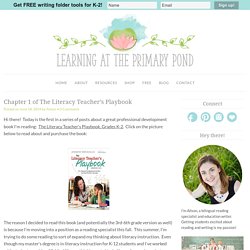
Today is the first in a series of posts about a great professional development book I’m reading: The Literacy Teacher’s Playbook, Grades K-2. Click on the picture below to read about and purchase the book: The reason I decided to read this book (and potentially the 3rd-6th grade version as well) is because I’m moving into a position as a reading specialist this fall. This summer, I’m trying to do some reading to sort of expand my thinking about literacy instruction. Even though my master’s degree is in literacy instruction for K-12 students and I’ve worked with students as old as 13, I feel like my thinking gets kind of hyperfocused on whatever grade level I’m currently teaching. Time to unpack it! The Research Based Classroom: The Literacy Teacher's Playbook - Chapter One. "This book is about being empowered by data and assessment, not bogged down by it.
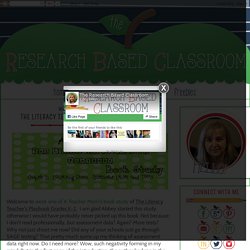
" (p. xv) How many of us feel bogged down rather than empowered? Is your answer different in October than it would be in April or May? In October I am mostly choosing the assessments I want to give but in April and May I am loaded down with district and state assessments that I won't even see the results while I still have the same students. By the time I see any results, I have a whole new group of learners. "To me, data are not only the numbers and letters, but also the actual stuff that a student produces...much of what you can pull out of your students' messy seat pocket is actually data. " Seriously?
What kind of data should I be looking for? According to the author, she recommends "that you try to collect at least one student artifact from each of the following lenses. " Reading Engagement . Click on the picture to download a copy of this. The Research Based Classroom: The Literacy Teacher's Playbook - Chapter 2. This week's chapter is called "Analyzing Data: Making Discoveries from Student Work" and we'll be talking about the first half of the chapter (up to page 62).
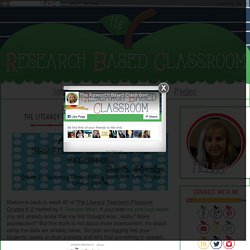
The first thing that hit me as I read this chapter is that the author suggests we look for potential areas of growth that are linked to the students' strengths. This is a very different idea for me. I usually look for things that my students are missing, but I don't consider if it's linked to an area of strength. By finding potential growth in an area of strength, the author suggests that we are within the student's zone of proximal development. It makes sense that we build their strengths, but it still leaves me considering when we tackle the missing gaps in their understanding. So let's get into analyzing the data. "...like anything, with practice, the process of analysis will become like second nature and you'll be able to move through it quickly and easily. " Engagement Inventory. The Research Based Classroom: The Literacy Teacher's Playbook - Chapter 2, Part 2.
Welcome back to week 3 of talking about The Literacy Teacher's Playbook by Jennifer Serravallo.
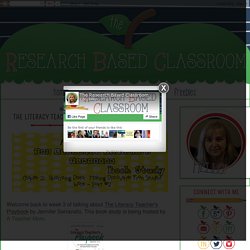
This book study is being hosted by A Teacher Mom. This post is part 2 of chapter 2, "Analyzing Data: Making Discoveries from Student Work. " I'm going to be talking about using running records for miscue analysis, using conversations, and analyzing writing samples. Part 1 of this chapter talked about other assessments such as engagement inventories, book logs, reading interest inventories, writing about reading and fluency assessments. Click here to read my post about the first half of chapter 2. Running Records. The Research Based Classroom: The Literacy Teacher's Playbook - Chapter 3. Welcome to week #4 of our study of The Literacy Teacher's Playbook Grades K-2 hosted by A Teacher Mom.
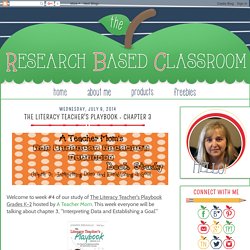
This week everyone will be talking about chapter 3, "Interpreting Data and Establishing a Goal. " The Research Based Classroom: The Literacy Teacher's Playbook - Chapter 4 Part 1. Welcome to week 5 of our study of The Literacy Teacher's Playbook hosted by A Teacher Mom.
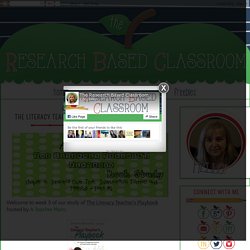
We've talked about collecting data and I want to emphasize that we should be looking for the data we already have - the work our students are doing. There's no need to create more assessments. We've talked about analyzing their work, looking for common inconsistencies to find what our students really need and to develop goals for support within their areas of strength. And finally, last week we talked about conferencing and setting goals with our students on an individual basis. Now it's time to create an action plan that answers a few critical questions: The Research Based Classroom: The Literacy Teacher's Playbook - Chapter 4 Part 2. This week we are looking into the second part of chapter 4 from pages 123 - 141, which looks at how to plan for practice over time.
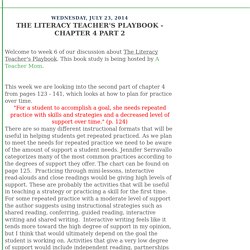
"For a student to accomplish a goal, she needs repeated practice with skills and strategies and a decreased level of support over time. " (p. 124) There are so many different instructional formats that will be useful in helping students get repeated practiced. As we plan to meet the needs for repeated practice we need to be aware of the amount of support a student needs. Jennifer Serravallo categorizes many of the most common practices according to the degrees of support they offer. The Research Based Classroom: The Literacy Teacher's Playbook - Chapter 4 Part 3. As we finish up chapter 4, I'll be talking about involving others, planning for multiple students and how to know when a student has met the goal.
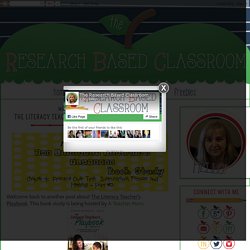
Involving Others "When a student receives mixed messages about what to be focusing on, the end result is often that the child focuses on none of it. " (p. 141) This totally is one of my teacher pet peeves. I find it so annoying when I have students who are pulled out for special education services and there is no coordination of teaching strategies, methodology, or even curriculum. The Research Based Classroom: Literacy Teacher's Playbook - Final Thoughts & Reflections. This is my final post about The Literacy Teacher's Playbook.
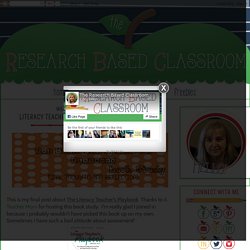
Thanks to A Teacher Mom for hosting this book study. I'm really glad I joined in because I probably wouldn't have picked this book up on my own. Sometimes I have such a bad attitude about assessment! I think the author makes a great case for how we can use assessment to inform instruction. Too often we don't use assessment to our advantage. Use the data you already have. Assess the students that puzzle you the most in multiple ways.
When making decisions about what a student needs, come up with 4 or 5 goals before choosing one. Find a student's strengths and then chose a goal that will move him/her forward from there. The July/August 2014 edition of Reading Today has an article titled, "Formative Assessment: Designing and Implementing a Viable System" by Douglas Fisher and Nancy Frey.